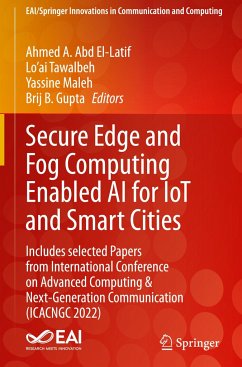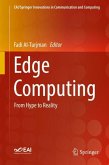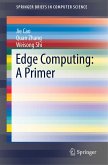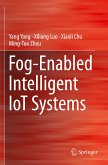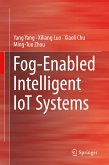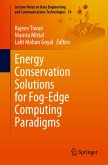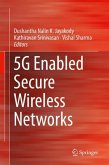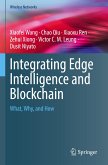Secure Edge and Fog Computing Enabled AI for IoT and Smart Cities
Includes selected Papers from International Conference on Advanced Computing & Next-Generation Communication (ICACNGC 2022)
Herausgegeben:Abd El-Latif, Ahmed A.; Tawalbeh, Lo'ai; Maleh, Yassine; Gupta, Brij B.
Secure Edge and Fog Computing Enabled AI for IoT and Smart Cities
Includes selected Papers from International Conference on Advanced Computing & Next-Generation Communication (ICACNGC 2022)
Herausgegeben:Abd El-Latif, Ahmed A.; Tawalbeh, Lo'ai; Maleh, Yassine; Gupta, Brij B.
- Gebundenes Buch
- Merkliste
- Auf die Merkliste
- Bewerten Bewerten
- Teilen
- Produkt teilen
- Produkterinnerung
- Produkterinnerung
This book gathers recent research in security and privacy to discuss, evaluate, and improve the novel approaches of data protection in IoT and edge and fog computing. The primary focus of the book addresses security mechanisms in IoT and edge/ fog computing, advanced secure deployments for large scaled edge/ fog computing, and new efficient data security strategy of IoT and edge/ fog computing. The book lays a foundation of the core concepts and principles of IoT and 5G security, walking the reader through the fundamental ideas. This book is aimed at researchers, graduate students, and…mehr
Andere Kunden interessierten sich auch für
![Edge Computing Edge Computing]() Edge Computing97,99 €
Edge Computing97,99 €![Edge Computing: A Primer Edge Computing: A Primer]() Jie CaoEdge Computing: A Primer52,99 €
Jie CaoEdge Computing: A Primer52,99 €![Fog-Enabled Intelligent IoT Systems Fog-Enabled Intelligent IoT Systems]() Yang YangFog-Enabled Intelligent IoT Systems75,99 €
Yang YangFog-Enabled Intelligent IoT Systems75,99 €![Fog-Enabled Intelligent IoT Systems Fog-Enabled Intelligent IoT Systems]() Yang YangFog-Enabled Intelligent IoT Systems97,99 €
Yang YangFog-Enabled Intelligent IoT Systems97,99 €![Energy Conservation Solutions for Fog-Edge Computing Paradigms Energy Conservation Solutions for Fog-Edge Computing Paradigms]() Energy Conservation Solutions for Fog-Edge Computing Paradigms75,99 €
Energy Conservation Solutions for Fog-Edge Computing Paradigms75,99 €![5G Enabled Secure Wireless Networks 5G Enabled Secure Wireless Networks]() 5G Enabled Secure Wireless Networks104,99 €
5G Enabled Secure Wireless Networks104,99 €![Integrating Edge Intelligence and Blockchain Integrating Edge Intelligence and Blockchain]() Xiaofei WangIntegrating Edge Intelligence and Blockchain38,99 €
Xiaofei WangIntegrating Edge Intelligence and Blockchain38,99 €-
-
-
This book gathers recent research in security and privacy to discuss, evaluate, and improve the novel approaches of data protection in IoT and edge and fog computing. The primary focus of the book addresses security mechanisms in IoT and edge/ fog computing, advanced secure deployments for large scaled edge/ fog computing, and new efficient data security strategy of IoT and edge/ fog computing. The book lays a foundation of the core concepts and principles of IoT and 5G security, walking the reader through the fundamental ideas. This book is aimed at researchers, graduate students, and engineers in the fields of secure IoT and edge/ fog computing. The book also presents selected papers from International Conference on Advanced Computing & Next-Generation Communication (ICACNGC 2022).
Produktdetails
- Produktdetails
- EAI/Springer Innovations in Communication and Computing
- Verlag: Springer / Springer International Publishing / Springer, Berlin
- Artikelnr. des Verlages: 978-3-031-51096-0
- 2024
- Seitenzahl: 276
- Erscheinungstermin: 20. März 2024
- Englisch
- Abmessung: 241mm x 160mm x 21mm
- Gewicht: 526g
- ISBN-13: 9783031510960
- ISBN-10: 3031510968
- Artikelnr.: 69490648
- Herstellerkennzeichnung Die Herstellerinformationen sind derzeit nicht verfügbar.
- EAI/Springer Innovations in Communication and Computing
- Verlag: Springer / Springer International Publishing / Springer, Berlin
- Artikelnr. des Verlages: 978-3-031-51096-0
- 2024
- Seitenzahl: 276
- Erscheinungstermin: 20. März 2024
- Englisch
- Abmessung: 241mm x 160mm x 21mm
- Gewicht: 526g
- ISBN-13: 9783031510960
- ISBN-10: 3031510968
- Artikelnr.: 69490648
- Herstellerkennzeichnung Die Herstellerinformationen sind derzeit nicht verfügbar.
Ahmed A. Abd El-Latif (SMIEEE, MACM) received the B.Sc. degree with honour rank in Mathematics and Computer Science in 2005 and M.Sc. degree in Computer Science in 2010, all from Menoufia University, Egypt. He received his Ph. D. degree in Computer Science & Technology at Harbin Institute of Technology (H.I.T), Harbin, P. R. China in 2013. He is an associate professor of Computer Science at Menoufia University, Egypt, and at EIAS Data Science Lab, College of Computer and Information Sciences, Prince Sultan University, Saudi Arabia. In more than 17 years of his professional experience, he published over 260 papers in journals/conferences including 10 books with over 8800 citations. He was also selected in the 2022, 2021 and 2020 Stanford University's ranking of the world's top 2% scientists. He involved in government and international funded R&D projects related to the widespread use of artificial intelligence for 5G/6G networks. He received many awards, State Encouragement Award in Engineering Sciences 2016, Arab Republic of Egypt; the best Ph.D. student award from Harbin Institute of Technology, China 2013; Young scientific award, Menoufia University, Egypt 2014. He is a fellow at Academy of Scientific Research and Technology, Egypt. His areas of interests are Cybersecurity, 5G/6G Wireless Networks, Post-Quantum Cryptography, Artificial Intelligence of Things, AI-Based Image Processing, Information Hiding, Dynamical systems (Discrete-time models: Chaotic systems and Quantum Walks). He is the leader of mega grant program "Research of network technologies with ultra-low latency and ultra-high density based on the widespread use of artificial intelligence for 6G networks". Dr. Abd El-Latif is the chair/co-chair of many Scopus/ EI conferences. He is the EIC of International Journal of Information Security and Privacy, and series editor of Advances in Cybersecurity Management. Also, academic editor/ associate editor for set of indexedjournals (Scopus journals' quartile ranking). Lo'ai Tawalbeh (IEEE SM) completed his PhD degree in Electrical & Computer Engineering from Oregon State University in 2004, and MSc in 2002 from the same university with GPA 4/4. Dr. Tawalbeh is currently an Associate professor at the department of Computing and Cyber Security at Texas A&M University-San Antonio. Before that he was a visiting researcher at University of California-Santa Barbra. Since 2005 he taught/developed more than 25 courses in different disciplines of computer engineering and science with focus on cyber security for the undergraduate/graduate programs at: NewYork Institute of Technology (NYIT), DePaul's University, and Jordan University of Science and Technology. Dr. Tawalbeh won many research grants and awards with over than 2 Million USD. He has over 80 research publications in refereed international Journals and conferences. Yassine Maleh is an associate professor of cybersecurityand IT governance at Sultan Moulay Slimane University, Morocco. He is a PhD in computer sciences, since 2017. He is the founding chair of IEEE Consultant Network Morocco and founding president of the African Research Center of Information Technology Cybersecurity. He is a senior member of IEEE and a member of the International Association of Engineers IAENG and The Machine Intelligence Research Labs. Dr Maleh has made contributions in the fields of information security and privacy, Internet of things security, wireless and constrained networks security. His research interests include information security and privacy, Internet of things, networks security, information system, and IT governance. He has published over than 100 papers (book chapters, international journals, and conferences/workshops), 17edited books, and 3 authored books. He is the editor-in-chief of the International Journal of Information Security and Privacy, and the International Journal of Smart Security Technologies (IJSST). He serves as an associate editor for IEEE Access (2019 Impact Factor 4.098), the International Journal of Digital Crime and Forensics (IJDCF), and the International Journal of Information Security and Privacy (IJISP). He is a series editor of Advances in Cybersecurity Management, by CRC Taylor & Francis. He was also a guest editor of a special issue on Recent Advances on Cyber Security and Privacy for Cloud-of-Things of the International Journal of Digital Crime and Forensics (IJDCF), Volume 10, Issue 3, July-September 2019. He has served and continues to serve on executive and technical program committees and as a reviewer of numerous international conferences and journals such as Elsevier Ad Hoc Networks, IEEE Network Magazine, IEEE Sensor Journal, ICT Express, and Springer Cluster Computing. He was the Publicity chair of BCCA 2019 and the General Chair of the MLBDACP 19 symposium and ICI2C'21 Conference. He received Publons Top 1% reviewer award for the years 2018 and 2019. Brij B. Gupta received PhD degree from Indian Institute of Technology Roorkee, India in the area of Information and Cyber Security. In 2009, he was selected for Canadian Commonwealth Scholarship awarded by Government of Canada. He published more than 250 research papers in International Journals and Conferences of high repute. His biography was selected and published in the 30th Edition of Marquis Who's Who in the World, 2012. Dr. Gupta also received Young Faculty research fellowship award from Ministry of Electronics and Information Technology, government of India in 2017. He is also working as principal investigator of various R&D projects. He served as associate editor of IEEE Access, IEEE TII, IJICS, etc. He is also serving as reviewer for Journals of IEEE, Springer, Wiley, Taylor & Francis, etc. He was also visiting researcher with Yamaguchi University, Japan, with Deakin University, Australia and with Swinburne University of Technology, Australia during January, 2015 and 2018, July 2017, and Mar-Apr. 2018, respectively. Moreover, he was also visiting Professor in University of Murcia, Spain in Jun.- Jul., 2018. Additionally, he was visiting professor with Temple university, USA and Staffordshire University, UK during June, 2019 and July 2020, respectively. At present, Dr. Gupta is working as Assistant Professor in the Department of Computer Engineering, National Institute of Technology Kurukshetra India. His research interest includes Information security, Cyber Security, Cloud Computing, Web security, Intrusion detection and Phishing.
Part 1: AI Enabled Smart City IoT System using Edge /Fog Computing.- Chapter 1. Multi-level edge computing system for autonomous vehicles.- Chapter 2. UAVs based edge computing system for smart city applications.- Chapter 3. Organization of Smart City Services Based on Microservice Architecture.- Chapter 4. Pseudo-Random Error-Correcting Codes in Network Coding.- Chapter 5. Proactive management in Smart City: transport convoys.- Chapter 6. Federated Learning for Linux Malware Detection: An Experimental Study.- Chapter 7. Delay prediction in M2M networks using Deep Learning approach.- Chapter 8. Energy-Efficient Beam Shaping in MIMO System Using Machine Learning.- Chapter 9. Channel Cluster Configuration Selection Method for IEEE 802.11 Networks Planning.- Chapter 10. Service migration algorithm for UAVs recharge zones in future 6G network.- Chapter 11. FedBA: Non-IID Federated Learning Framework in UAV Networks.- Part 2: Fog/Edge Computing Security Issues.- Chapter 12. Big Data Analytics for Secure Edge-based Manufacturing Internet of Things (MIoT).- Chapter 13. Artificial Intelligence-Based Secure Edge Computing Systems for IoTDs and Smart Cities: A Survey.- Chapter 14. Machine Learning Techniques for Secure Edge SDN.- Chapter 15. Machine Learning-Based Identity and Access Management for Cloud Security.- Chapter 16. Spatial Data of Smart Cities: Trust.- Chapter 17. Smart City Infrastructure Projects: Spatial Data of Risks.- Chapter 18. A Comparative Analysis of Blockchain-Based Authentication Models for IoT Networks.- Chapter 19. Development of determining a wireless client location method in the IEEE 802.11 network in order to ensure the IT infrastructure security.
Part 1: AI Enabled Smart City IoT System using Edge /Fog Computing.- Chapter 1. Multi-level edge computing system for autonomous vehicles.- Chapter 2. UAVs based edge computing system for smart city applications.- Chapter 3. Organization of Smart City Services Based on Microservice Architecture.- Chapter 4. Pseudo-Random Error-Correcting Codes in Network Coding.- Chapter 5. Proactive management in Smart City: transport convoys.- Chapter 6. Federated Learning for Linux Malware Detection: An Experimental Study.- Chapter 7. Delay prediction in M2M networks using Deep Learning approach.- Chapter 8. Energy-Efficient Beam Shaping in MIMO System Using Machine Learning.- Chapter 9. Channel Cluster Configuration Selection Method for IEEE 802.11 Networks Planning.- Chapter 10. Service migration algorithm for UAVs recharge zones in future 6G network.- Chapter 11. FedBA: Non-IID Federated Learning Framework in UAV Networks.- Part 2: Fog/Edge Computing Security Issues.- Chapter 12. Big Data Analytics for Secure Edge-based Manufacturing Internet of Things (MIoT).- Chapter 13. Artificial Intelligence-Based Secure Edge Computing Systems for IoTDs and Smart Cities: A Survey.- Chapter 14. Machine Learning Techniques for Secure Edge SDN.- Chapter 15. Machine Learning-Based Identity and Access Management for Cloud Security.- Chapter 16. Spatial Data of Smart Cities: Trust.- Chapter 17. Smart City Infrastructure Projects: Spatial Data of Risks.- Chapter 18. A Comparative Analysis of Blockchain-Based Authentication Models for IoT Networks.- Chapter 19. Development of determining a wireless client location method in the IEEE 802.11 network in order to ensure the IT infrastructure security.

